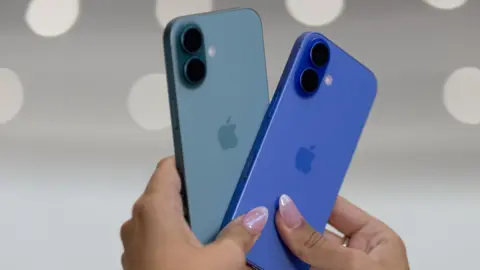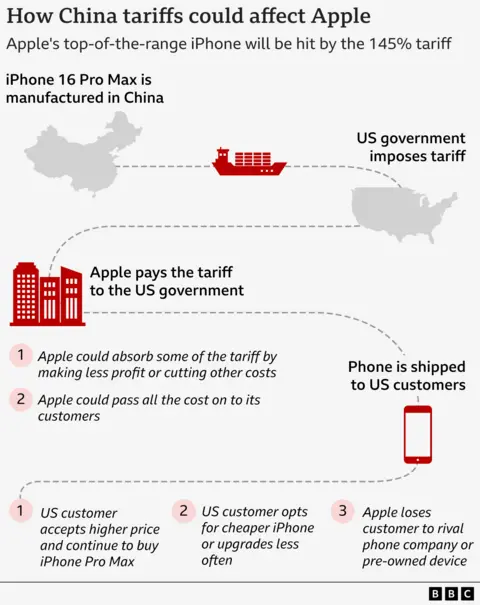Technology reporter
 Reuters
ReutersThe world’s most popular gadgets – phones, laptops, tablets, smartwatches – could be about to get a lot more expensive in the US.
Many of them are made in China, which now faces a 145% tariff on its goods imported to the US, under President Donald Trump’s controversial trade policy.
The effect this may have on the iPhone and its maker Apple is under the spotlight – with some analysts saying if costs are passed onto consumers, iPhone prices in the US could rise by hundreds of dollars.
And if the tariffs impact the value of the dollar, it could become more expensive to import iPhones and other devices around the world – potentially leading to higher prices in UK shops.
Ben Wood of CCS Insight told the BBC that if tariffs remain in place, Apple may raise iPhone prices globally when the next iteration is launched.
“It is unlikely the company would want to have differentiated pricing globally,” he said – as the tech giant would want to avoid people buying the device cheaply in the UK and selling it on for profit in the US.
Though others say they believe it could result in cheaper prices if firms which normally send their goods to the US instead send them to countries which don’t have such steep tariffs, like the UK.
And there may be a significant change if the cost of tariffs is passed onto consumers globally – longer contracts to spread out the cost of the device.
While a phone contract may typically last two years, Mr Wood said some firms already offer four year deals, and he believed “we might see five-year contracts” in 2025.
“One could argue it is almost like having a mortgage for your smartphone,” he said.
Where are iPhones made?
The US is a major market for iPhones and Apple accounted for more than half of its smartphones sales last year, according to Counterpoint Research.
It says as much as 80% of Apple’s iPhones intended for US sale are made in China, with the remaining 20% made in India.
Along with fellow smartphone giants such as Samsung, Apple has been trying to diversify its supply chains to avoid over-reliance on China in recent years.
India and Vietnam emerged as frontrunners for additional manufacturing hubs.
As tariffs took effect, Apple reportedly looked to speed up and increase its production of India-produced devices in recent days.
Reuters reported on Thursday that Apple chartered cargo flights to ship more than 600 tons of iPhones from India to the US.
Amid Trump’s 90-day pause on tariffs, including those levied on India, the country may be set to benefit from an iPhone manufacturing boost.
The BBC has approached Apple for comment on the impact of tariffs on their operations and prices, but has not had any response yet.

How exposed is Apple to tariffs?
Trump and his advisors have said the aim of its tariffs are to encourage more US manufacturing.
However, the tech industry relies on a global network of suppliers for product components and assembly.
This, and finding skilled workers to match the fast pace and low cost of production in Asia, means relocating supply chains is no simple feat.
Apple committed a $500bn (£385bn) investment in the US in February – which the Trump administration believes will result in more homegrown manufacturing.
But Wedbush Securities analyst Dan Ives said shifting parts of its supply chain from cheaper manufacturing hubs in Asia to the US will take a lot of time, and money.
“The reality is it would take 3 years and $30 billion dollars in our estimation to move even 10% of its supply chain from Asia to the US with major disruption in the process,” he wrote on X on 3 April.
Will iPhone prices go up?
Apple have not revealed yet whether they plan to pass on the costs of the tariffs onto consumers in the US and increase prices.
Some analysts believe Apple is in a more fortunate position than others, having reaped more money from its products than it has spent on making them.
“As a company with lucrative margins on its devices, Apple can absorb some of the tariff-induced cost increases without significant financial impact, at least in the short term,” says Forrester principal analyst Dipanjan Chatterjee.
But he notes the company’s strong branding and popularity may allow it to pass some costs to consumers without too much backlash.
“The brand commands better loyalty than its competitors, and it is unlikely that a manageable price increase will send these customers fleeing into the arms of Android-based competitors.”
Some estimates suggest iPhone prices in the US could as much as triple if costs were passed to consumers.
Following Trump’s tariff increase on China to 125%, the cost for a China-made iPhone 16 Pro Max with 256GB storage would have surged from $1,199 to $1,999, according to estimates by investment banking firm UBS.
They estimate a less significant increase on the iPhone 16 Pro 128GB storage – which is made in India – by five percent from $999 to $1046.
While some analysts such as Dan Ives have suggested that the cost of a “Made in USA” iPhone could soar to as much as $3500.
What can consumers do about it?
There’s still plenty of uncertainty about what happens next, and how companies like Apple will respond to tariffs remains to be seen.
This hasn’t stopped some US customers reportedly rushing to Apple stores to buy its smartphones.
The BBC spoke to shoppers outside an Apple Store in New York who had bought products in fear of a potential price hike.
Anthony Cacioppo, a 53-year-old DJ and security technician, purchased the new iPhone.
“I really didn’t need a phone… but I’m not ready to pay double the price,” he said.
Bruce Conroy, a hair stylist, told the BBC that even if prices had risen considerably he “would have stuck with Apple products” – though potentially delayed his purchase of a new iPad.
“I bought it because the tariffs are coming, I want to buy before the prices go up and I expect they will,” said Julia Baumann, a personal finance editor, of her new MacBook.

We will likely have to wait until the autumn to see how much the next iPhone will cost.
But if it looks like costs incurred by tariffs will result in higher price tags, some may look to rival handsets or second-hand devices.
CCS Insight estimates that 5.5m second-hand smartphones will be sold in the UK in 2025, representing 29.7% of the total market.
The iPhone remains one of the most expensive smartphones on the market – and brands such as Google and Samsung offer phones with similar features at a lower cost.
The other option, and perhaps the most cost-effective, could be for people to skip upgrades to newer iPhone models and look to slightly older, cheaper versions.
“The path of least resistance would be to keep the smartphone they already have for longer,” said Mr Wood.
Additional reporting by Paul Sargeant, Tom Finn and Pratiksha Ghildial.













